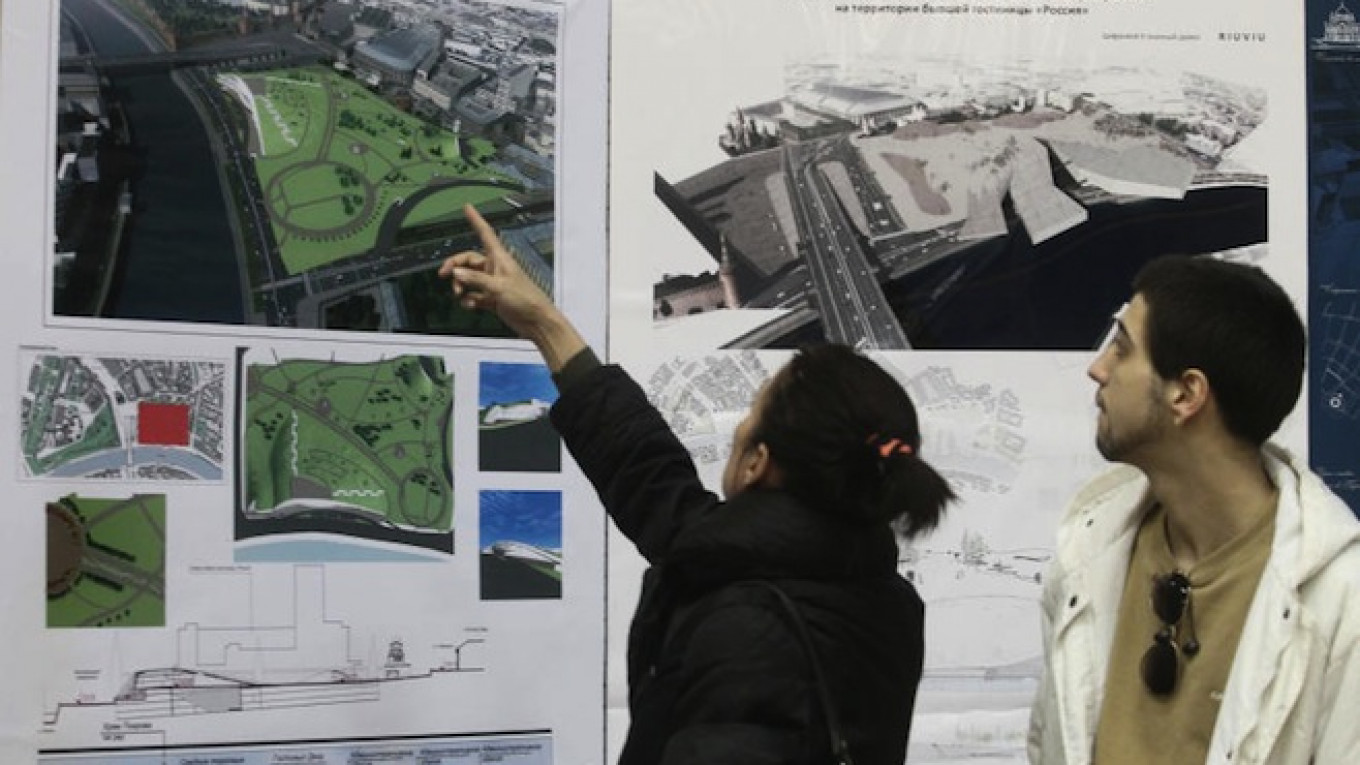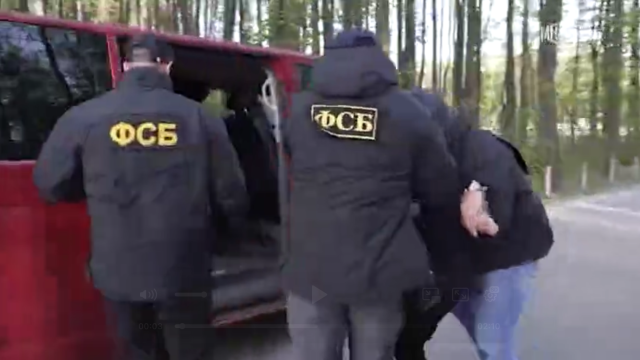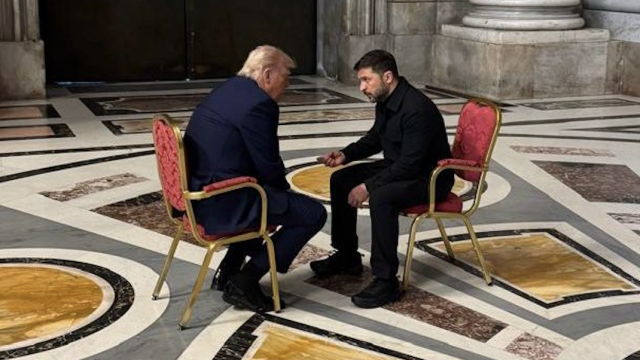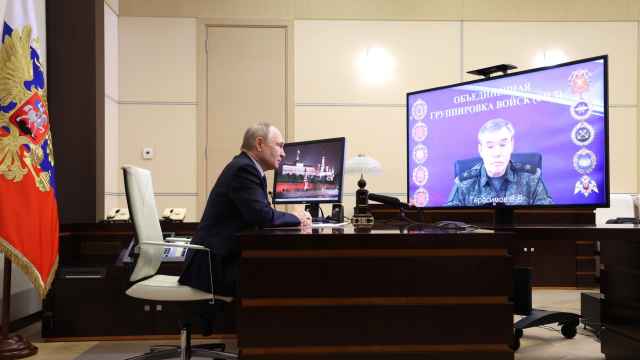City Hall's plans to renovate Moscow's historic Zaryadye district, located right next to the Kremlin and Red Square, are once again about to change.
Last week, plans for a large upscale hotel right next to the future Zaryadye park were presented to the public, and immediately elicited outсry from the architectural preservation organization Arkhnadzor. To build the hotel, Arkhnadzor activists said in a statement, the developer will have to demolish several historic buildings on Ulitsa Varvarka, one of the oldest streets in Moscow.
“It is surprising that the laying out of a park initiated by the Russian president in Zaryadye can go ahead alongside the demolition of authentic remains of this district. The developer hopes to bypass the law and pass its reputation risks onto the country's authorities,” the Arkhnadzor statement said.
Moscow authorities confirmed Friday that a Mandarin Oriental hotel would be built in Zaryadye, but said that historical facades would be kept intact. Furthermore, the new hotel will be a reconstruction of a beautiful building destroyed in the 1920s, Moscow's chief architect Sergei Kuznetsov said at a press conference Friday.
From Giant Hotel to Park
The future Zaryadye park will be located between Moskvoretskaya Naberezhnaya and Ulitsa Varvarka, on a large site of about 13 hectares that used to be occupied by the infamous hotel Rossiya.
Rossiya was built in 1969 as was one of the largest hotels in the world. It had 2,700 rooms that could accommodate 5,000 guests, a movie theater and a concert hall that used to host all high-profile shows and gala events.
In 2004, Moscow authorities decided to demolish the hotel, saying the 40-year-old concrete and glass colossus was outdated. It was demolished in 2006.
Then-mayor Yury Luzhkov, known for his controversial construction decisions, wanted to build a large multifunctional complex instead that would include hotel rooms and offices, a plan that prompted accusations that the mayor was using the project to make money.
In 2010 Vladimir Zhirinovsky, the outspoken leader of the LDPR party, accused Luzhkov of selling shares in the Rossiya hotel to foreign investors, but then-Prime Minister Vladimir Putin laughed off the accusations as a joke.
For years, the site in the very heart of the city was abandoned. It was not until 2012 — five years after the demolition — that the authorities decided its fate. Moscow Mayor Sergei Sobyanin proposed two projects to Putin: a parliamentary center and a business center with a hotel, but Putin suggested another option — the creation of a park.
From Giant Park to Hotel
The decision was supported at all levels, and an international contest was announced in 2013 in order to choose the best project for the future park. In November 2013, after six months of discussions, a project by the New York architectural bureau Diller Scofidio + Renfro was chosen by a jury that consisted of Moscow City Hall officials and foreign experts.
According to the plans, the park will feature four different types of landscapes found in Russia: tundra, steppes, forest and bogs. The project's authors stipulated it would be integrated into the architectural style of the district.
A hotel was not part of the plan, which only foresaw the building of a concert hall and a parking lot for 500 cars. But on Oct. 16, during the yearly Moscow Urban Forum, plans to build a Mandarin Oriental hotel at 14 Ulitsa Varvarka were unveiled.
“The project won a closed international contest launched by the Turbo investment company and supported by Moscow's [municipal government] committee for architecture and urban development and department of cultural heritage,” Arkhnadzor said in its statement. “But in July, scaffolding was erected at this address, which means there's a demolition threat to the last buildings remaining from old Zaryadye,” the statement read.
Restoration, Not Demolition
Kuznetsov, Moscow's chief architect and deputy chair of the city's committee for architecture and urban development, confirmed Friday there were plans to build a hotel on Varvarka.
“There is a decision [to build a hotel]. We're not planning to demolish the buildings [that exist there],” he told The Moscow Times at a press conference. “These buildings are quite old, there are valuable elements there, and we had a serious examination [of the site],” he said.
The whole Zaryadye district was examined by UNESCO experts, Kuznetsov added. “We had a UNESCO mission [visiting] Moscow, they came with a large program, including [an examination] of Zaryadye,” the architect said.
The district is developing, and there will be more buildings than planned, Kuznetsov admitted, but the buildings will have to comply with restrictions concerning the height and size of buildings and conservation of their valuable elements.
As to the buildings on Varvarka, their historical look will be restored, according to Kuznetsov.
“In addition to the corner building [looking out to Kitai-Gorod] that was constructed at the beginning of the 20th century, the neighboring building's historical appearance will be restored,” he said.
That building, the chief architect added, was almost entirely destroyed in the 1920s, but it used to have “vivid architecture” and looked drastically different to how it does now.
“According to the plans [for the hotel], the street's historical authenticity will be restored,” Kuznetsov said. “It's a step forward in terms of developing the territory,” he added.
Contact the author at d.litvinova@imedia.ru
A Message from The Moscow Times:
Dear readers,
We are facing unprecedented challenges. Russia's Prosecutor General's Office has designated The Moscow Times as an "undesirable" organization, criminalizing our work and putting our staff at risk of prosecution. This follows our earlier unjust labeling as a "foreign agent."
These actions are direct attempts to silence independent journalism in Russia. The authorities claim our work "discredits the decisions of the Russian leadership." We see things differently: we strive to provide accurate, unbiased reporting on Russia.
We, the journalists of The Moscow Times, refuse to be silenced. But to continue our work, we need your help.
Your support, no matter how small, makes a world of difference. If you can, please support us monthly starting from just $2. It's quick to set up, and every contribution makes a significant impact.
By supporting The Moscow Times, you're defending open, independent journalism in the face of repression. Thank you for standing with us.
Remind me later.






